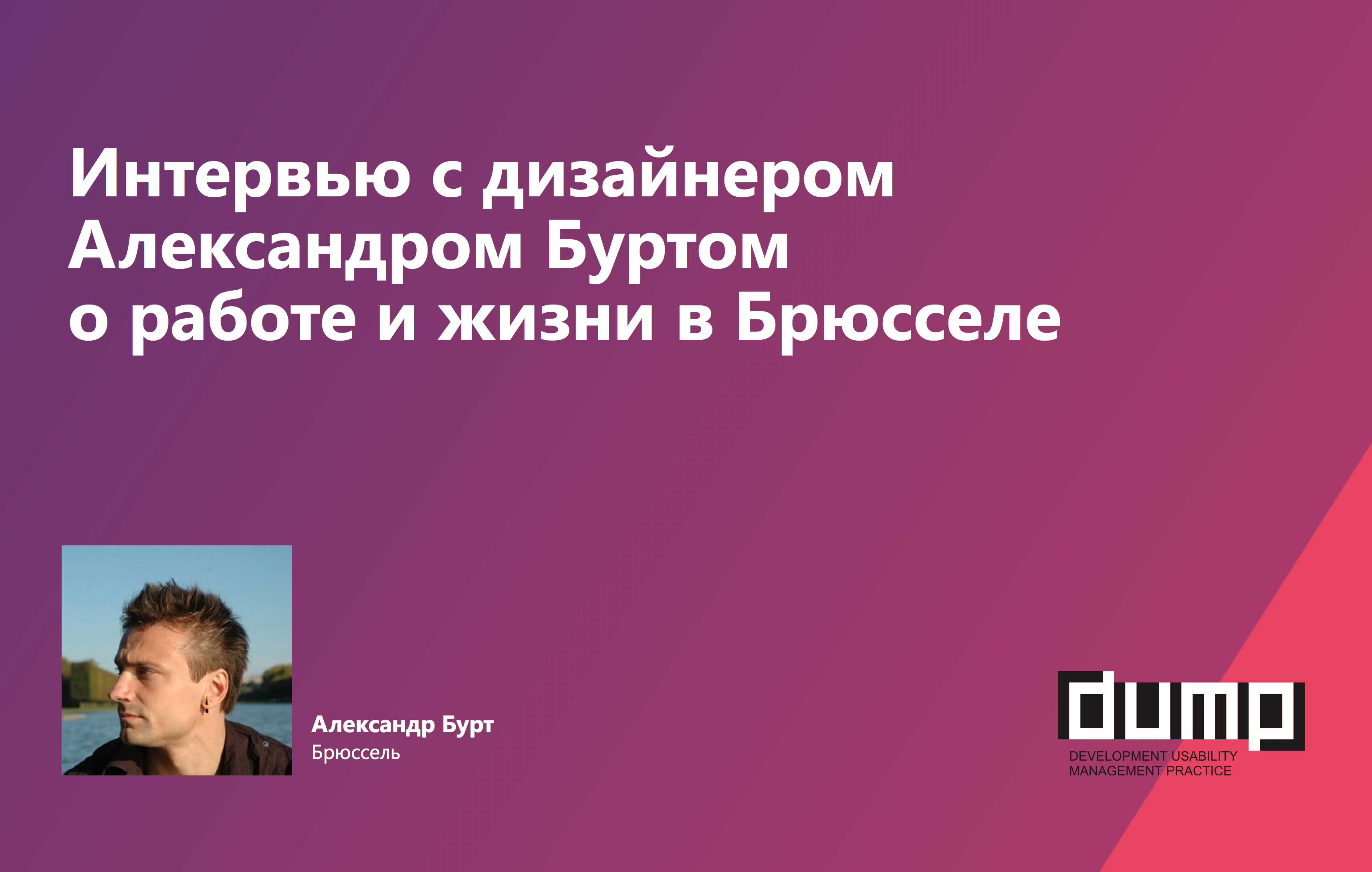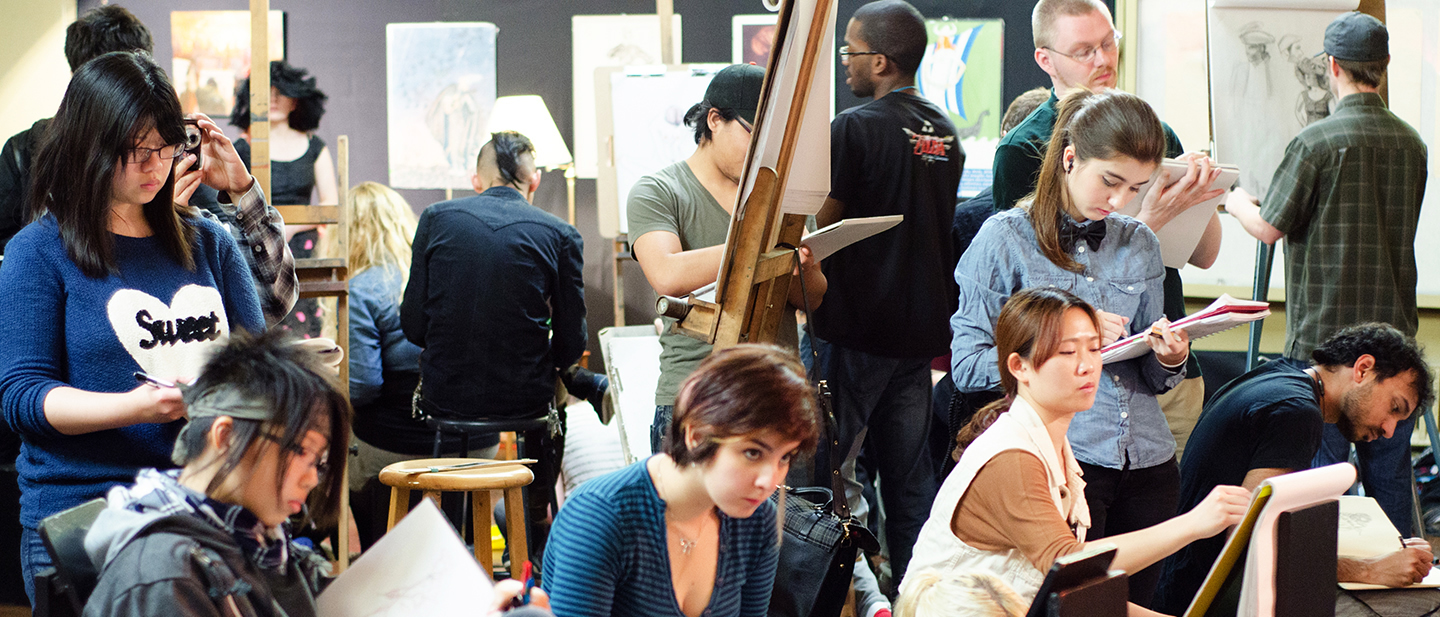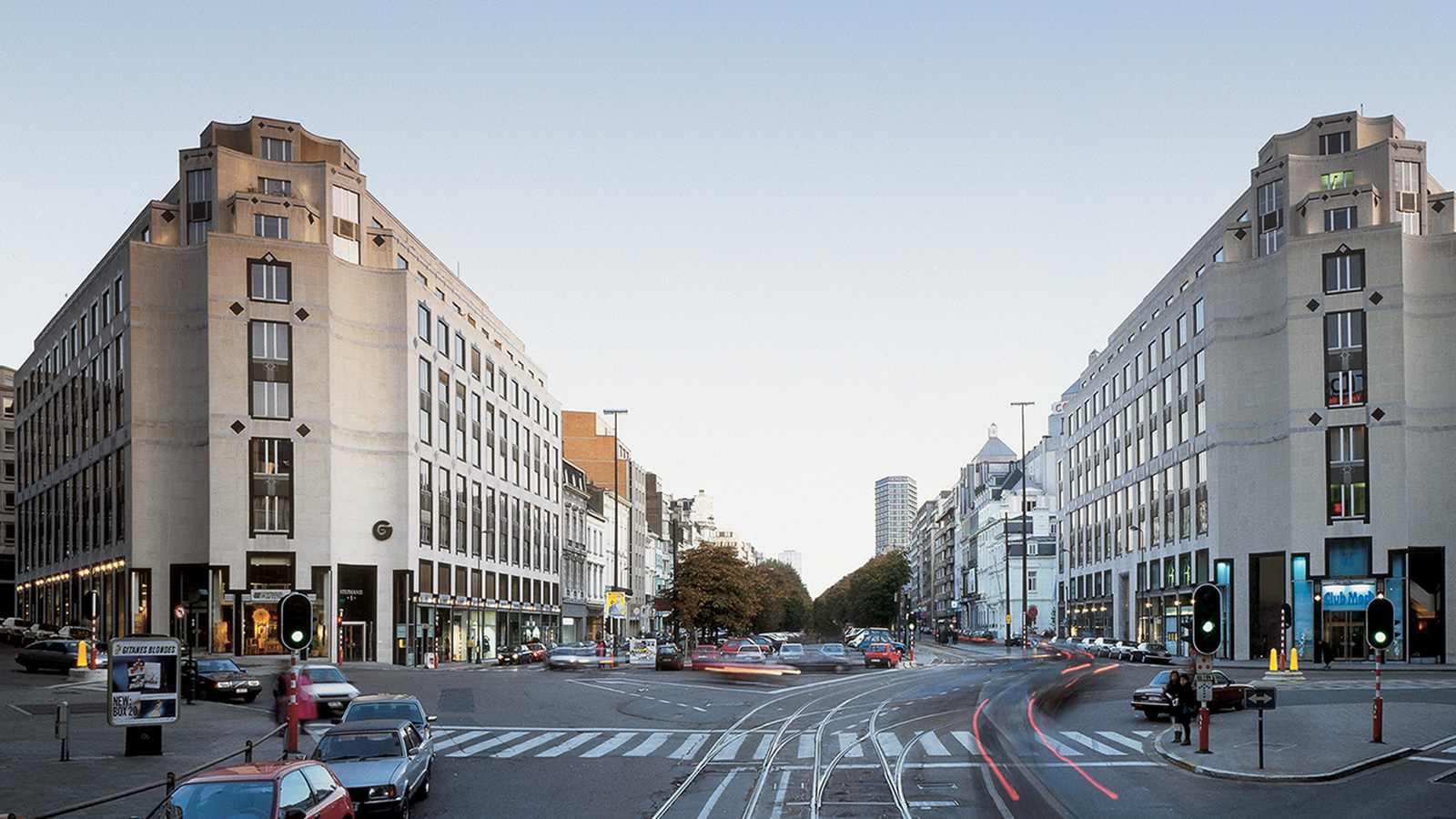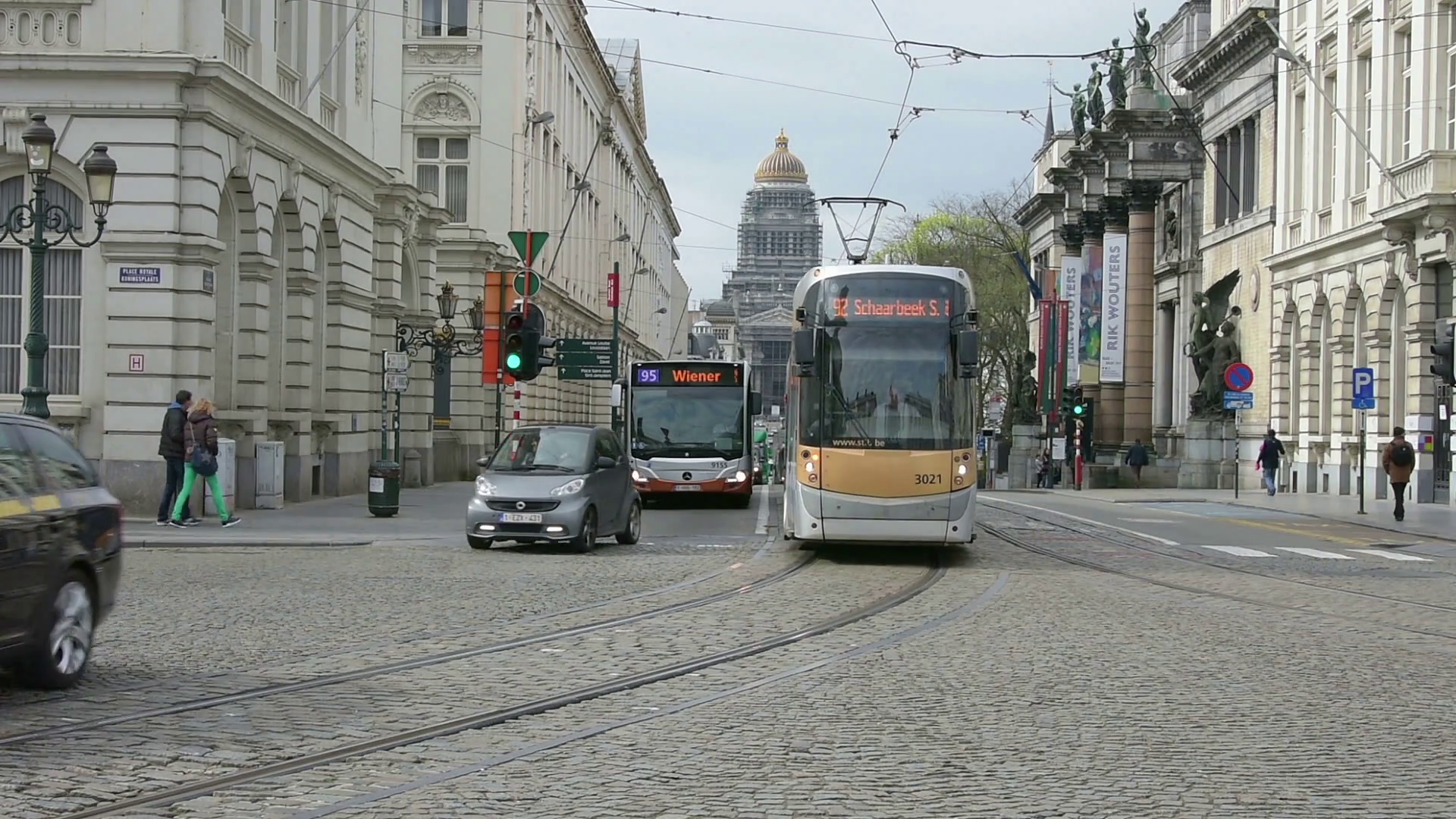Interview with designer Alexander Burt about work and life in Brussels
On the eve of the DUMP conference, we traditionally do a series of interviews with speakers about their work and life.
The first interview was given by the designer, UX-designer, developer, graduate of the Academy of Fine Arts in San Francisco, ex-chief designer of the UX at Parallels Alexander Burt. In an interview, he told what the Academy of Art in San Francisco taught him, whether the designer should go to work in Belgium and whether it is expensive to start a business.

')
You graduated from the San Francisco Academy of Art. Tell me, please, how did you get there? What did you study? What are your school experiences?
After school, I almost immediately went to work, got a “Photoshop Specialist” in Imaginif and spent a year and a half figachil with a typical task like “this building will have a bank, we want to show them how it will look, but a truck closes half a wall, clean out and then insert photorealistic 3D into it. ” It seemed to work, but it became boring. Somehow a graduate of www.scad.edu came to us and very vividly described her studies. Showed the brochure. I caught fire, but my parents refused at first. I clearly remember the phrase: “And what, will you be in the 29th monkey cartoon to draw the 46th paw?” Take care, they say, with something serious. But I don’t give up so easily, and after half a year eating away at their brains, they agreed. And by that time I chose www.academyart.edu , because it was physically close to the animation studios, and they advertised that they were taught by working professionals. (So, by the way, it turned out.)
I studied special effects at the faculty of computer graphics. Most of all in my education I appreciate the fact that the first two years we were not allowed at all to the computer. We had drawing, painting, modeling, anatomy, photography, lighting (with real lamps that heat up like hell, and the room is closed, so everything is wet), etc. That is, by the time I opened “Maya” and clicked “Create Camera”, I understood exactly all the settings of the virtual camera, and what physical effects they imitate. Well, everything like that. I acted to learn how to do something cool in 3D, but I graduated from a person who knows how to competently tell visual stories.

Typical painting lesson at the Academy
In your opinion, what is the main difference between design education in the United States and Russia?
In 2018, I do not see much difference, and this is not only in Russia, but in general in the world. The merit of the United States is that they first learned to dream productively. Not only "defensegas", but also a little magic. Why start the car into orbit? For the lulz. Absolutely worthy reason.
With the spread of the Internet, especially over the past 10 years, everyone else has learned this from them, and now everyone can do it. Maybe not exactly the same, maybe not in the same quantity, but wherever you go now, the same hipster neon is everywhere.
In terms of education, everything is the same. After all, people who care, nowhere silent. What pedagogical kick in the ass we all got from Tyoma Lebedev? And he is not the only one. Whatever you think about aliens in Chertanovo, the graphics are cool! And these guys probably teach. So on average everywhere with this is normal now.
By the way, after all, in America, too, they learned from nowhere what they can do. There are also not silent people who care. The book "The Illusion Of Life" describes how Walt Disney traveled around the country and begged money from the bankers for Snow White, and they blinked their eyes, not sticking at all, as you could cut the dough on some moving pictures. But Walt was able to convince, and it turned out what happened.
Now you live in Brussels. Why precisely Belgium? Did you consciously choose a country in advance where you want to work, or did you get an offer that you cannot refuse?
The Union collapsed, the parents moved. I was 16 then, I was just a piece of luggage :)
And why did you still move there after school, why didn’t you choose Moscow or any city of America? What do you like about this city and country?
During my studies, I gained enough reputation and personal connections to find work in the States. But it so happened that I finished my studies on an expired visa and was obliged to leave the country. I returned to Belgium terribly upset, but life somehow began to turn, and America faded into the background. I went to work in Spain for a couple of years in Ilion , then for 7 years in Moscow. And then it so happened that his wife was transferred to Brussels for work, and now I'm here again.
I like the location of Belgium - you can go abroad by chance. 3.5 hours by car to Paris, 3 hours to Amsterdam, 2 hours to Cologne. There are a lot of foreigners in Brussels (Zhezh European Commission), then knowing several languages for a large chunk of the population is just a fact of life, and after the third or fourth language, and then you simply absorb the fourth without much difficulty, the brain is already adapting.
Here, in principle, the normal weather. It is said that the country is rainy, but it just seems that way because it is often overcast. I was growing up in Riga until the age of twelve, and compared to those lead clouds, the Belgian clouds are shining with gold, so I'm fine with it :)

Brussels
If it's not a secret, please tell me about salaries and expenses? How much does the designer in Brussels receive, how much is spent on housing, travel, food?
A good designer will get € 1650-1800. Apartment / communal / bills will cost somewhere in the 1000-1100 €. Then we take 30 € for the phone, 40 € for home Internet, 200-300 € for food. 50 € will be spent on public transport. A car and gasoline is a separate topic, a liter of 95th gasoline costs 1.20 €. Accordingly, fill the tank of a small car 45 €. Enough for a week. As a result, there is little.
What is the difference between the life and work of a designer in Russia and in Belgium? Have you encountered something unexpected / unusual in terms of organizing work, life, mentality? How long did you get used to local life?
I did not notice major differences, especially in a professional environment. When people are busy with work, everything else somehow disappears. One thing confused me when I moved to Moscow in 2007: it turns out that it is acceptable to yell at each other at work. Uh ... no. But those were exceptions. He also noted that in Russia there is much more hunger for knowledge, for the new. The Belgians are a bit frostbitten in this regard.

Brussels
Is it possible for a Russian designer to get a job in a Belgian company? Can you give any advice? What specialists are now in demand?
Unlikely. Firstly, the population of the whole of Belgium is smaller than the population of Moscow, and the companies associated with the design can be counted on the fingers.
And secondly, here and so madhouse with unemployment benefits, it drags huge money from the budget, and they try to arrange their own parasites as much as possible. I faced the same in Russia. Many countries have quotas for foreign labor, and there's nothing you can do.
An exception may be if the person is very talented and famous, and for some reason he is needed in the office, and not vice versa.
It is necessary to understand the monetary side of the issue. In Belgium, in order to officially hire someone for 1000 €, you have to pay 2000 € in social payments to the state. That is, if I take you for 1000 €, you cost me 3000 € per month. Therefore, everyone is trying to hire only private entrepreneurs, to negotiate with them on the amount, and everyone understands with his own taxes. Income tax in Belgium - 35-50%, in proportion to profits.
One more thing. There are many countries in Europe with different income levels. The Belgians are not idiots - they make orders for those who are cheaper, but cheaper where taxes are lower, for example, in Eastern Europe. If you exaggerate, then guys, well, what are the Belgian design companies? Poles have been drawing everything for a long time :)
I know that you now have your project. Tell me more about it, please? How difficult is it to start a business in Belgium?
Opening a company costs 6,000 € of authorized capital and 900 € to a notary, and starting a business is like plowing like a horse and hoping for the best.
I make a graphic editor. Next while silent :)
Tell me a little about the Belgians. What are they colleagues / friends? Is it comfortable to work with them? How did you solve the language issue?
I would describe the cultural difference as follows: if in Belgium there is space for 4 cars, and it is lined up for 4 cars, then there will be 4 cars, according to the rules. But if the places are not marked, then there will be 3 or even 2 cars. “Well, I got up, the place was. And then nothing interests me. ” In Russia, if the space for 4 cars is cleared, then 3 cars will stand there. But if there are no strips, then 5 cars will fit there neatly, and carefully close each other's mirrors.
There were no problems with the language, because when I moved I already had English, and over time I learned French.

What tools do you use to organize work (including time planning, work space organization, etc.)?
For organization and planning I use GitHub. I am very pleased with it, especially since projects with columns of cards appeared. I draw and write thoughts in a regular notebook — somehow I think better by hand. Brains in the elbows, I guess.
I also have a board hanging, sometimes I think on it. True, the space on the board has to be won back from my daughter: if I wipe a little man, this is a tragedy, but she is only 3, and it is not always clear that this is a little man. Notebooks also pulled away everything, but I zanykal one notebook and write in it :)
Do you read any professional blog? What information resources would you recommend to your colleagues for the development of skills?
Google, Reddit and YouTube, and then what happens.
On April 13, Alexander will hold a big master class “Philosophy of Color” at the DUMP conference in Yekaterinburg. Alexander will analyze the connection between colors and the semantic diversity of life, talk about the role of color in perception, about the structure of subjective perception, principles of construction and organization of meanings, analogies and symbols, gradients and rainbows, noise and the search for meanings. In addition, Alexander will make a report about colorpickers. Detailed description of the master class and the report .
Thanks to our sponsors, who make the conference possible: the general partner - the company Sberbank-Technology , the conference partners: SKB Kontur , Naumen , Tinkoff.ru , ProSoft Sistems , Very Interesting , Skb_Lab .
The first interview was given by the designer, UX-designer, developer, graduate of the Academy of Fine Arts in San Francisco, ex-chief designer of the UX at Parallels Alexander Burt. In an interview, he told what the Academy of Art in San Francisco taught him, whether the designer should go to work in Belgium and whether it is expensive to start a business.

')
You graduated from the San Francisco Academy of Art. Tell me, please, how did you get there? What did you study? What are your school experiences?
After school, I almost immediately went to work, got a “Photoshop Specialist” in Imaginif and spent a year and a half figachil with a typical task like “this building will have a bank, we want to show them how it will look, but a truck closes half a wall, clean out and then insert photorealistic 3D into it. ” It seemed to work, but it became boring. Somehow a graduate of www.scad.edu came to us and very vividly described her studies. Showed the brochure. I caught fire, but my parents refused at first. I clearly remember the phrase: “And what, will you be in the 29th monkey cartoon to draw the 46th paw?” Take care, they say, with something serious. But I don’t give up so easily, and after half a year eating away at their brains, they agreed. And by that time I chose www.academyart.edu , because it was physically close to the animation studios, and they advertised that they were taught by working professionals. (So, by the way, it turned out.)
I studied special effects at the faculty of computer graphics. Most of all in my education I appreciate the fact that the first two years we were not allowed at all to the computer. We had drawing, painting, modeling, anatomy, photography, lighting (with real lamps that heat up like hell, and the room is closed, so everything is wet), etc. That is, by the time I opened “Maya” and clicked “Create Camera”, I understood exactly all the settings of the virtual camera, and what physical effects they imitate. Well, everything like that. I acted to learn how to do something cool in 3D, but I graduated from a person who knows how to competently tell visual stories.

Typical painting lesson at the Academy
In your opinion, what is the main difference between design education in the United States and Russia?
In 2018, I do not see much difference, and this is not only in Russia, but in general in the world. The merit of the United States is that they first learned to dream productively. Not only "defensegas", but also a little magic. Why start the car into orbit? For the lulz. Absolutely worthy reason.
With the spread of the Internet, especially over the past 10 years, everyone else has learned this from them, and now everyone can do it. Maybe not exactly the same, maybe not in the same quantity, but wherever you go now, the same hipster neon is everywhere.
In terms of education, everything is the same. After all, people who care, nowhere silent. What pedagogical kick in the ass we all got from Tyoma Lebedev? And he is not the only one. Whatever you think about aliens in Chertanovo, the graphics are cool! And these guys probably teach. So on average everywhere with this is normal now.
By the way, after all, in America, too, they learned from nowhere what they can do. There are also not silent people who care. The book "The Illusion Of Life" describes how Walt Disney traveled around the country and begged money from the bankers for Snow White, and they blinked their eyes, not sticking at all, as you could cut the dough on some moving pictures. But Walt was able to convince, and it turned out what happened.
Now you live in Brussels. Why precisely Belgium? Did you consciously choose a country in advance where you want to work, or did you get an offer that you cannot refuse?
The Union collapsed, the parents moved. I was 16 then, I was just a piece of luggage :)
And why did you still move there after school, why didn’t you choose Moscow or any city of America? What do you like about this city and country?
During my studies, I gained enough reputation and personal connections to find work in the States. But it so happened that I finished my studies on an expired visa and was obliged to leave the country. I returned to Belgium terribly upset, but life somehow began to turn, and America faded into the background. I went to work in Spain for a couple of years in Ilion , then for 7 years in Moscow. And then it so happened that his wife was transferred to Brussels for work, and now I'm here again.
I like the location of Belgium - you can go abroad by chance. 3.5 hours by car to Paris, 3 hours to Amsterdam, 2 hours to Cologne. There are a lot of foreigners in Brussels (Zhezh European Commission), then knowing several languages for a large chunk of the population is just a fact of life, and after the third or fourth language, and then you simply absorb the fourth without much difficulty, the brain is already adapting.
Here, in principle, the normal weather. It is said that the country is rainy, but it just seems that way because it is often overcast. I was growing up in Riga until the age of twelve, and compared to those lead clouds, the Belgian clouds are shining with gold, so I'm fine with it :)

Brussels
If it's not a secret, please tell me about salaries and expenses? How much does the designer in Brussels receive, how much is spent on housing, travel, food?
A good designer will get € 1650-1800. Apartment / communal / bills will cost somewhere in the 1000-1100 €. Then we take 30 € for the phone, 40 € for home Internet, 200-300 € for food. 50 € will be spent on public transport. A car and gasoline is a separate topic, a liter of 95th gasoline costs 1.20 €. Accordingly, fill the tank of a small car 45 €. Enough for a week. As a result, there is little.
What is the difference between the life and work of a designer in Russia and in Belgium? Have you encountered something unexpected / unusual in terms of organizing work, life, mentality? How long did you get used to local life?
I did not notice major differences, especially in a professional environment. When people are busy with work, everything else somehow disappears. One thing confused me when I moved to Moscow in 2007: it turns out that it is acceptable to yell at each other at work. Uh ... no. But those were exceptions. He also noted that in Russia there is much more hunger for knowledge, for the new. The Belgians are a bit frostbitten in this regard.

Brussels
Is it possible for a Russian designer to get a job in a Belgian company? Can you give any advice? What specialists are now in demand?
Unlikely. Firstly, the population of the whole of Belgium is smaller than the population of Moscow, and the companies associated with the design can be counted on the fingers.
And secondly, here and so madhouse with unemployment benefits, it drags huge money from the budget, and they try to arrange their own parasites as much as possible. I faced the same in Russia. Many countries have quotas for foreign labor, and there's nothing you can do.
An exception may be if the person is very talented and famous, and for some reason he is needed in the office, and not vice versa.
It is necessary to understand the monetary side of the issue. In Belgium, in order to officially hire someone for 1000 €, you have to pay 2000 € in social payments to the state. That is, if I take you for 1000 €, you cost me 3000 € per month. Therefore, everyone is trying to hire only private entrepreneurs, to negotiate with them on the amount, and everyone understands with his own taxes. Income tax in Belgium - 35-50%, in proportion to profits.
One more thing. There are many countries in Europe with different income levels. The Belgians are not idiots - they make orders for those who are cheaper, but cheaper where taxes are lower, for example, in Eastern Europe. If you exaggerate, then guys, well, what are the Belgian design companies? Poles have been drawing everything for a long time :)
I know that you now have your project. Tell me more about it, please? How difficult is it to start a business in Belgium?
Opening a company costs 6,000 € of authorized capital and 900 € to a notary, and starting a business is like plowing like a horse and hoping for the best.
I make a graphic editor. Next while silent :)
Tell me a little about the Belgians. What are they colleagues / friends? Is it comfortable to work with them? How did you solve the language issue?
I would describe the cultural difference as follows: if in Belgium there is space for 4 cars, and it is lined up for 4 cars, then there will be 4 cars, according to the rules. But if the places are not marked, then there will be 3 or even 2 cars. “Well, I got up, the place was. And then nothing interests me. ” In Russia, if the space for 4 cars is cleared, then 3 cars will stand there. But if there are no strips, then 5 cars will fit there neatly, and carefully close each other's mirrors.
There were no problems with the language, because when I moved I already had English, and over time I learned French.

What tools do you use to organize work (including time planning, work space organization, etc.)?
For organization and planning I use GitHub. I am very pleased with it, especially since projects with columns of cards appeared. I draw and write thoughts in a regular notebook — somehow I think better by hand. Brains in the elbows, I guess.
I also have a board hanging, sometimes I think on it. True, the space on the board has to be won back from my daughter: if I wipe a little man, this is a tragedy, but she is only 3, and it is not always clear that this is a little man. Notebooks also pulled away everything, but I zanykal one notebook and write in it :)
Do you read any professional blog? What information resources would you recommend to your colleagues for the development of skills?
Google, Reddit and YouTube, and then what happens.
On April 13, Alexander will hold a big master class “Philosophy of Color” at the DUMP conference in Yekaterinburg. Alexander will analyze the connection between colors and the semantic diversity of life, talk about the role of color in perception, about the structure of subjective perception, principles of construction and organization of meanings, analogies and symbols, gradients and rainbows, noise and the search for meanings. In addition, Alexander will make a report about colorpickers. Detailed description of the master class and the report .
Thanks to our sponsors, who make the conference possible: the general partner - the company Sberbank-Technology , the conference partners: SKB Kontur , Naumen , Tinkoff.ru , ProSoft Sistems , Very Interesting , Skb_Lab .
Source: https://habr.com/ru/post/352032/
All Articles